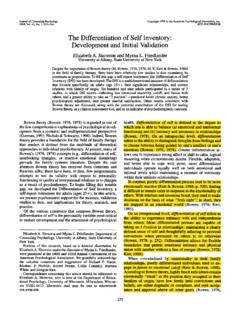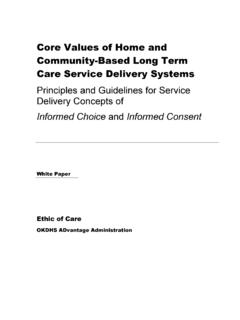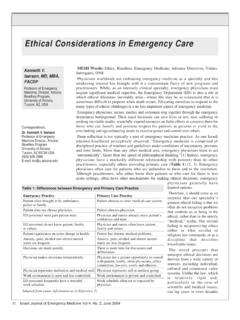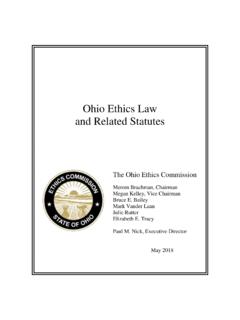Transcription of Ethics of Care - Cabrillo College - Breakthroughs …
1 Cabrillo College Claudia Close Philosophy 10 Ethics Introduction to the Ethic of care There is a current debate over whether the Ethic of care is a genuinely new approach to Ethics or whether it is a re-articulation of a virtue ethic; In the Ethic of care , one seeks to develop a skill at giving care appropriately all the while balancing the amount of care necessary to sustain oneself. Since there is a goal: To care and to be cared for, 1 it might even be thought of as having a consequentialist appeal. There are certainly aspects of a deontological Kantian approach: not only is respect for persons commanded but some care theorists write of the usefulness of rules when the moral agent is insufficiently skilled or motivated in care giving. Perhaps the strongest position would be to think of it as more of an attitude or perspective as opposed to a full blown theory; It has only been around 20 or so years and is very much still in the process of being articulated.
2 Despite having some common strains, there is an explicit rejection of core aspects of the three major theories we have studied thus far. The foundation of the ethic of care is largely a rejection of a Kantian notion that the ideal moral agent is dispassionate, objective and operates solely in accord with rationally derived moral principles. For Kant, emotional connections with others are seen as biases which negatively affect one s ability to act in adherence with these principles. In the Ethic of care , it is our very caring that is seen as an essential ingredient and motivator to respond ethically. Further, the utilitarian justification of the needs of the many outweighing the needs of the few is not acceptable in the Ethic of care . Lastly, Aristotle s warrior virtues are not the focus; caring for and about others is central. care is both an attitude towards others as well as a skill to be acquired.
3 Justification. One of the early sources of the Ethic of care can be found in Carol Gilligan s2 critiques of Lawrence Kohlberg s conclusions from his Piagetic studies of the patterns of moral maturation in young boys. For Gilligan, Kohlberg s identification of the mature stage as a Kantian, dispassionate principle- oriented agent made certain assumptions about moral ideals embedded in a male bias. "Women's deference is rooted not only in their social subordination but also in the substance of their moral concern. Sensitivity to the needs of others and the assumption of responsibility for taking care lead women to attend to voices other than their own and to include in their judgment other points of view. Women's moral weakness, manifest in an apparent diffusion and confusion of judgment, is thus inseparable from women's moral strength, and overriding concern with relationships and responsibilities.
4 The reluctance to judge may itself be indicative of the care and concern for others that infuse the psychology 1 Manning, Rita, Speaking from the Heart, Rowman & Littlefield Publishers, Inc., June 1992 ISBN-13: 9780847677337 2 Gilligan, Carol, In a Different Voice, Cambridge, Mass.: Harvard University Press, 1982 of women's development and are responsible for what is generally seen as problematic in its nature." 3 Jean Grimshaw later raised three concerns regarding conventional historical approaches emphasizing principled, autonomous, objective moral agents4: 1. Rule based theories tend to reflect a male bias. 2. Rule based theories tend to present a view that morality can be impartial this is denied by feminist writers if it s your mother or child you cannot and perhaps should not be completely impartial. 3. The women s experience which involves more relational concerns is valid in moral decision making What is care ?
5 care involves treating people not only with respect (Kant) but actually attempting to empathize with them and try to help them in anyway that is feasible. The distinctive elements Jeanne Liedtka5 sees of an ethic of care are: a. Attention to particular others in actual contexts b. A focus on the needs versus the interests of those others c. A commitment to dialogue as the primary means of moral deliberation d. It is not a system of principles, but a mode of responsiveness These are contrasted to the typical masculine ethic of justice, where the self is separate, and uses rights to maintain the separation. care has an emphasis on relationships and the responsibilities they entail. The appropriate metaphor is the web, contrasted to the hierarchy of masculine thinking. Instead of a rule based system, solutions are founded on a willingness to compromise and accommodate so that the needs of all may be met.
6 However, Manning recognizes that any ethic which requires us to behave like Mother Teresa would inevitably lead to "caring burn-out" for many of us. Limiting our obligations to care may be done through an understanding of our own ability and by balancing a certain reciprocity in our caring relationships. Not all caring involves unilateral self-sacrifice - much of it between friends and sometimes with animals is reciprocal. We gain sustenance and strengthen our ability to care by engaging in these relationships. We need to build networks of care6 to avoid the risk of exploitation of the caregiver. A caring network of family, friends & neighbors is a microcosm for the care ethic in larger communities. It is practical in varying degrees by everyone in the community. In these functional networks, everyone gives and receives care according to ability and need.
7 It is not seen as a one-to-one reciprocal or contractual relationship: One does not care for someone else only because they expect to receive an equal amount of care later from that same person. Some theorists see this network as an expanding notion care first about your family and friends, then neighborhood, then state, then country, then world. Others make little distinction among sentient beings of the world. 3 Ibid. 4 Grimshaw, Jean, The Idea of a Female Ethic 5 Liedtka, Jeanne M., Feminist Morality and Competitive Reality: A Role for an Ethic of care ? 6 Ibid. Further, care is seen as a skill which one can acquire and hone and which is principally based on one s own experiences of giving and receiving care . It is not the exclusive purview of women: it is seen as both an innate preference and something that one gets better at though paying moral attention.
8 7 As with most other skills, even unsuccessful experiences can contribute to one s ability to care for example, there are those who were abused as children who are able to stop the cycle by consciously acquiring appropriate parenting skills through alternate means. Who deserves care ? Everyone there is no one who does not deserve some care . In essence anything which is capable of suffering is deserving of care . This doesn t mean we cannot punish people who behave badly (separate them from the public) but it does mean that we don t treat them without some care . ( The nun played by Susan Sarandon who comes to care for Sean Penn s character in Dead Man Walking ) For some theorists, care is extended beyond the sentient world to include things like caring for institutions or the environment. When are we obligated to care ? Our obligation to care is established by three principle factors: 1.
9 The presence of an existing relationship, 2. a need for care and, 3. our ability to respond driven by a rich understanding of the context and a skillful application of the appropriate measures. Peter Singer wrote that if we can prevent harm to others without sacrificing anything of greater moral worth, then we have an obligation to do Manning cites David Hume as an inspiration and writes, Hume saw morality as resting upon a human capacity for sympathetic identification with others. 9 In the case where we do not naturally care , perhaps because of a lack of understanding or a difficulty forming sympathetic connections, we must move from this natural caring towards what Manning refers to as ethical caring. 10 Nel Noddings suggests that we consult via our moral imagination, what we would do if we were our ideal caring self. 11 Though the Ethic of care emphasizes the importance and even priority of relationships, we may have obligations to provide for care that extend beyond our caring network and would include caring for strangers as well as those who are close to us.
10 These obligations are subject to the need that exists, and our ability to provide an appropriate response, Most care theorists agree that caring is not necessarily based on reciprocity that is even though someone has provided care for us in the past, if our resources are currently exhausted and we are unable to provide care , we are then not obligated to do so. Think how strange and fiscally impossible it would be to demand that Haiti be prepared to render the assistance to the exact degree that the provided aid following their Mw earthquake in 2010! We may have obligations to provide care even if we have no expectation for future reciprocal responses this again hinges on the 7 ibid. 8 Singer, Peter, Practical Ethics (Cambridge University Press, 1979) 9 Manning, Rita, Speaking from the Heart 10 ibid. 11 Noddings, Nel, Caring: A Feminine Approach to Ethics an Moral Education (Berkeley: University of California Press, 1984) need for care and our ability to respond to that need without sacrificing prior and more compelling obligations.

















